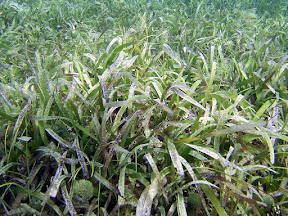Marineplants: Difference between revisions
From coraldigest
BrianNaess (talk | contribs) No edit summary |
BrianNaess (talk | contribs) |
||
| Line 2: | Line 2: | ||
<span class="floatright" style="height:216; width:288;"><https://lh4.googleusercontent.com/-8NH8UBCt-7g/UPWOjmp4MjI/AAAAAAAAIBA/A1OPgZkxXRE/s288/turtle_grass.jpg</span> | <span class="floatright" style="height:216; width:288;"><https://lh4.googleusercontent.com/-8NH8UBCt-7g/UPWOjmp4MjI/AAAAAAAAIBA/A1OPgZkxXRE/s288/turtle_grass.jpg</span> | ||
Sea grasses are marine flowering plants rarely exposed to air (usually only during low tides). The common sea grass species found in Caribbean coral reefs are turtle grass and eel grass. <ref name="sumich">Sumich, James L. An Introduction to the Biology of Marine Life, Seventh Edition. WCB/McGraw Hill. 1999.</ref> | |||
Flowering plants like sea grass have leaves, stems, and roots. Sea grasses "produce horizontal stems, or rhizomes, that attach the plants in soft sediments or to rocks." <ref name="sumich" /> Sea grass is a food staple for many [[ReefInhabitants#Reef_Creatures|creatures]] above and below the water (ex. sea turtles). | Flowering plants like sea grass have leaves, stems, and roots. Sea grasses "produce horizontal stems, or rhizomes, that attach the plants in soft sediments or to rocks." <ref name="sumich" /> Sea grass is a food staple for many [[ReefInhabitants#Reef_Creatures|creatures]] above and below the water (ex. sea turtles). | ||
Revision as of 13:32, 28 May 2013
Marine Plant Photos
<
Sea grasses are marine flowering plants rarely exposed to air (usually only during low tides). The common sea grass species found in Caribbean coral reefs are turtle grass and eel grass. [1]
Flowering plants like sea grass have leaves, stems, and roots. Sea grasses "produce horizontal stems, or rhizomes, that attach the plants in soft sediments or to rocks." [1] Sea grass is a food staple for many creatures above and below the water (ex. sea turtles).
Sea grasses can "reproduce vegetatively by sprouting additional vertical leaves form the lengthening horizontal rhizome" or by using water currents to pollinate underwater stigma. [1]